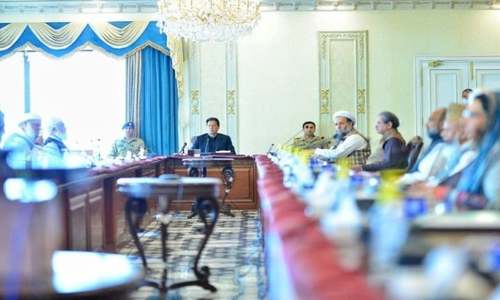Pakistan to send chloroquine tablets to US, Saudi Arabia among others: Awan

Special Assistant to the Prime Minister on Information and Broadcasting Firdous Ashiq Awan on Tuesday said that the federal cabinet has decided to send chloroquine tablets to "friendly nations" to help them in their time of need.
While briefing the media after a cabinet meeting in Islamabad, Awan said that one million chloroquine tablets will be sent to Saudi Arabia and United States each, 500,000 to Turkey and Italy each, 5m to the United Kingdom, 700,000 to Kazakhstan and 300,000 to Qatar.
The SAPM added that Prime Minister Imran Khan informed the cabinet that leaders of some countries had called him and expressed a desire to import the tablets from Pakistan following some encouraging results in treating the coronavirus.
Read: Chloroquine and coronavirus — what is the connection?
"Pakistan has always been asking these countries for something or the other. So, for the sake of humanity and to improve Pakistan's credibility and face value, this is a good chance to help them in this time of need," she said.
She also said that Pakistan had some 40 million tablets in stock and possessed the raw material to make even more.
The SAPM criticised the "opposition's role" in the pandemic, adding that a "political statement" was being made. She was referring to the National Accountability Bureau's warning to PML-N leader Shehbaz Sharif on Monday, after which the opposition PML-N demanded “live broadcast of questioning from him” during his appearance on Wednesday.
The SAPM quipped that opposition members had suddenly started "gracing media screens" and become Shehbaz's representatives rather than of the people they were elected to represent. She advised them to talk to the people about "corona pains" rather than "NAB pains" and to help and support the government's efforts to deal with the pandemic.
Tax exemptions for construction sector
Awan added that the cabinet approved tax exemptions for the construction sector. "Taxes on services which come under the Islamabad Capital Territory (Tax on Services) Ordinance 2001 have been amended and exemptions provided.
"The current five per cent tax on construction services, taxes on services provided by property dealers and real estate agents and taxes on services provided by property developers have been reduced to zero," she added.
The SAPM added that all "plumbers, electricians, labourers and investors" would be protected under the amendments to the legislation. "The prime minister reiterated during the cabinet meeting that when the wheel of the industry starts turning, the stove of the labourer's home starts burning," she said.
Reconstitution of National Commission for Minorities
The SAPM also revealed that the cabinet approved reforms in the National Commission for Minorities Act, 1992. She added that the prime minister directed that under the reforms, the commission should constitute a majority of members from among members of minority communities instead of Muslims and the chairman should also be from among the minorities.
"The commission will now constitute two Muslims, two Hindus, three Christians, one Sikh, one Parsi and one member from the Kalash community while the chairman of the commission will also be from among the minorities."
'Commission to submit report in 90 days'
Meanwhile, Minister for Planning, Development and Special Initiatives Asad Umar in a video message said that the Mohammad Ali Commission report would be made public as per the cabinet's decision.
The nine-member commission headed by former chairman of the Securities and Exchange Commission of Pakistan Mohammad Ali was formed in 2019 to investigate the reasons behind the high cost of electricity especially in connection with independent power producers (IPPs).
He also revealed that the cabinet decided to form an inquiry committee that would be headed by the prime minister's Special Assistant on Power Shahzad Qasim. "The committee will investigate where the law was broken and submit its report in 90 days," Umar added.
"Anybody who has violated the law and has affected the people of Pakistan will not be spared. The government will fully act on the recommendations [of the committee] without looking at who is included," the SAPM said, adding that the government wanted to bring those responsible to task while "following the due process of law and not through a media trial".












































